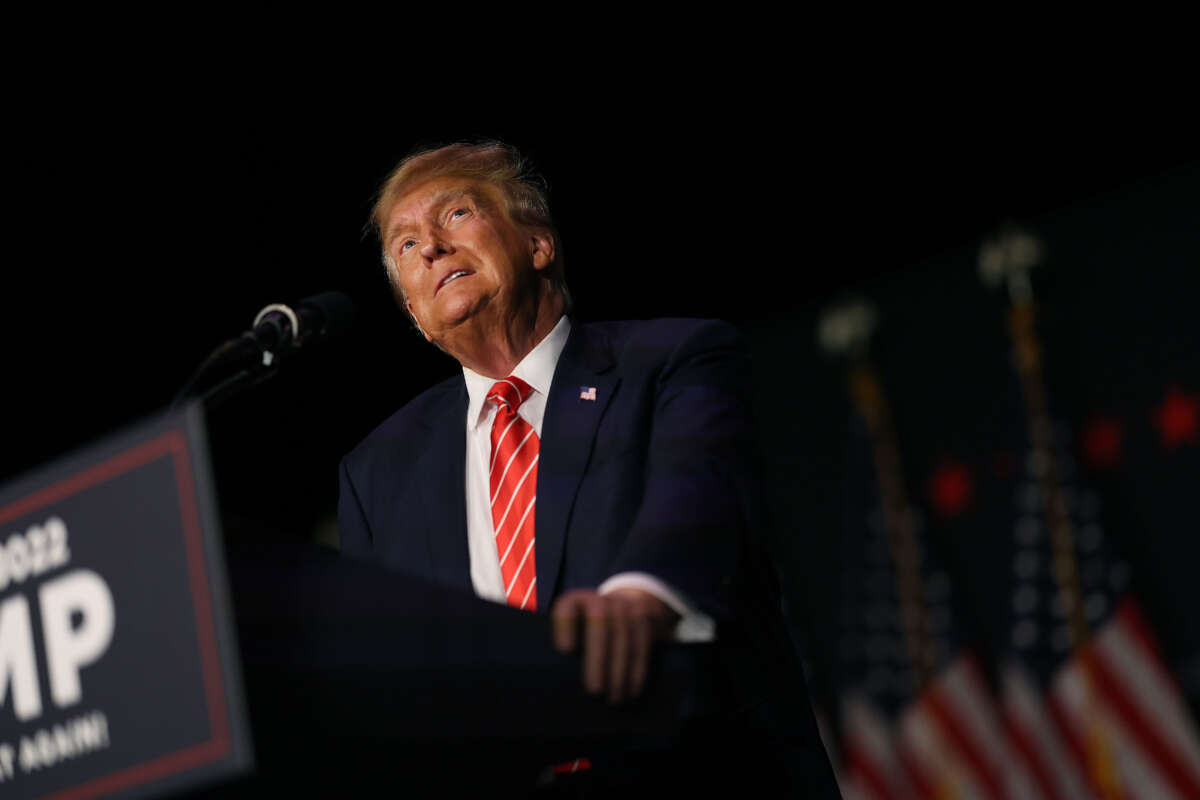Fulton County District Attorney Fani Willis said in an interview Tuesday that the sprawling racketeering case against Trump and his co-defendants could extend past the presidential election into early 2025.
“I believe in that case there will be a trial,” Willis said during an interview at the Washington Post global women’s summit. “I believe the trial will take many months. And I don’t expect that we will conclude until the winter or the very early part of 2025.”
There are several areas where delays are likely to happen and could cause the trial to be extended beyond the 2024 election, Bennett Gershman, a former New York prosecutor and law professor at Pace University, told Salon.
“I am thinking of potential leaks of evidence and proceedings to investigate and remedy the leaks, claims that witnesses are being intimidated and the need to investigate such claims, ongoing discovery motions and the considerable litigation involving those motions,” Gershman said.
Other factors that could impact the case may include the possibility of more defendants pleading guilty and the need to reshape the case and the evidence that’s presented to the jury as a result of that, he added.
“And of course the problems that will attend the need to select an impartial jury in the midst of one of the most controversial and consequential elections in American history,” Gershman said.
Legal experts have questioned why the D.A. has raised the possibility of the case likely going into 2025 since she said last month that they were ready to go to a four-month trial.
But the “sheer number” of defendants and the range of RICO charges will make this case longer than most, Laurie Levenson, a law professor at Loyola Marymount University, told Salon.
“Each defendant is likely to file motions, examine witnesses, and even seek appeals that could delay the trial,” Levenson said. “By its nature, RICO is a charge that includes multiple conspiracies and schemes. Therefore, this case will be a combination of many different conspiracies, each of which will take time to present to the jury.”
Trump, who is the front-runner for the 2024 Republican nominee for president, has pleaded not guilty and repeatedly tried to delay his different legal cases until after the 2024 presidential election.
It is “hard” to determine what impact Trump’s Georgia trial will have on the presidential election since it depends on several unknown factors, Levenson pointed out. These include the possibility of additional defendants pleading guilty and cooperating, how strong the prosecution’s evidence be, if Trump is convicted in another case and how much the trial sidelines Trump from campaigning.
“It is not abnormal that a sprawling RICO trial, such as the one facing Trump, would take many months to reach a verdict,” Temidayo Aganga-Williams, white-collar partner at Selendy Gay Elsberg and former senior investigative counsel for the House Jan. 6 committee, told Salon. “What is odd is that the Trump legal team has been pushing to delay all of his criminal trials past Election Day. Trump clearly sees winning the White House and thereafter obstructing the completion of the criminal cases against him as the best way for him to avoid prison time.”
Trump has accused Willis of being influenced by politics, “but to alter the trial schedule to subordinate the criminal justice system to the presidential campaign schedule would do just that,” he added, arguing that Trump cannot have it both ways.
The public’s right to have criminal cases of significant importance adjudicated quickly should not be disregarded because a private citizen made the choice to run for office, Aganga-Williams said. “A voluntary campaign for political office is not a shield from accountability.”
The trial start date has not yet been set in the case. So far, four defendants have pleaded guilty to reduced charges in exchange for their cooperation.
“We’ve also seen many of the most culpable defendants already plead guilty and we can be sure that more guilty pleas will be forthcoming,” Aganga-Williams said. “This will only ease the pressure on the trial schedule by making it more likely that there will be one trial in Georgia and not multiple.”
The former president is expected to follow his “typical playbook and lie” about why he is on trial, the reason for the trial schedule as well as the conduct of Willis and President Joe Biden, he added.
“It is of utmost importance that the focus remains on why Trump is in the situation he is in — multiple grand juries of his peers found probable that he engaged in extensive criminal conduct to intentionally undermine the integrity of our elections,” Aganga-Williams said.
Our most important fundraising appeal of the year
December is the most critical time of year for Truthout, because our nonprofit news is funded almost entirely by individual donations from readers like you. So before you navigate away, we ask that you take just a second to support Truthout with a tax-deductible donation.
This year is a little different. We are up against a far-reaching, wide-scale attack on press freedom coming from the Trump administration. 2025 was a year of frightening censorship, news industry corporate consolidation, and worsening financial conditions for progressive nonprofits across the board.
We can only resist Trump’s agenda by cultivating a strong base of support. The right-wing mediasphere is funded comfortably by billionaire owners and venture capitalist philanthropists. At Truthout, we have you.
We’ve set an ambitious target for our year-end campaign — a goal of $225,000 to keep up our fight against authoritarianism in 2026. Please take a meaningful action in this fight: make a one-time or monthly donation to Truthout before December 31. If you have the means, please dig deep.
